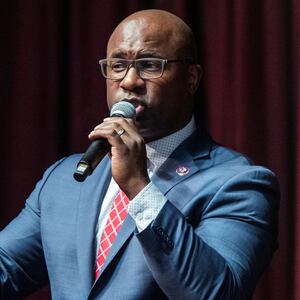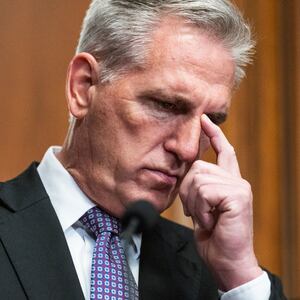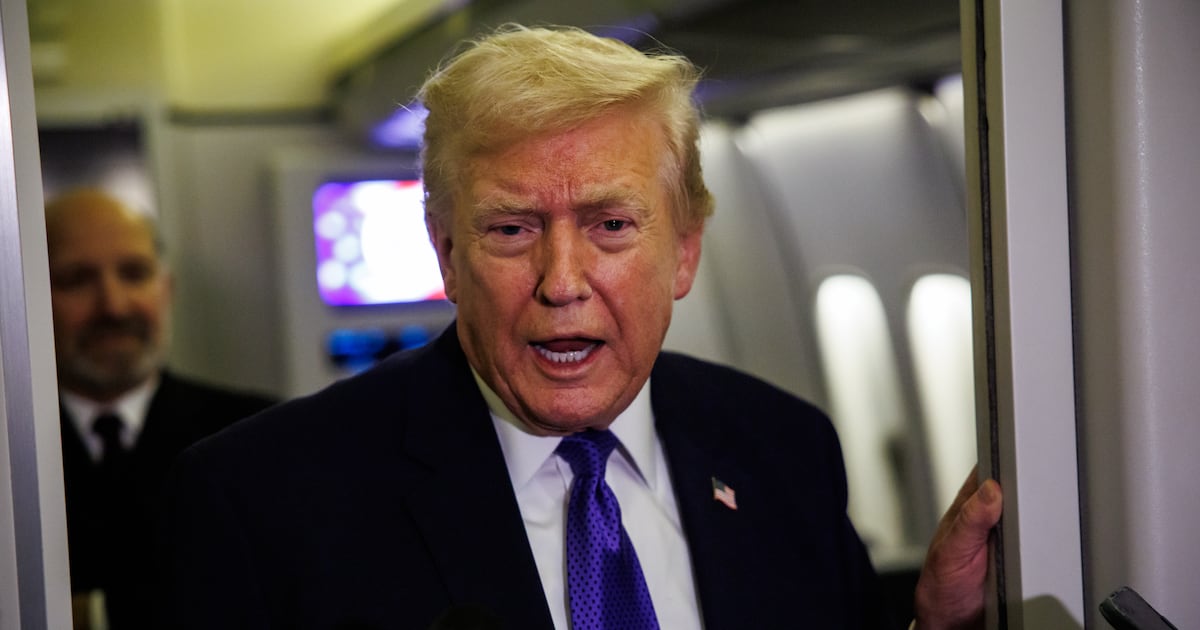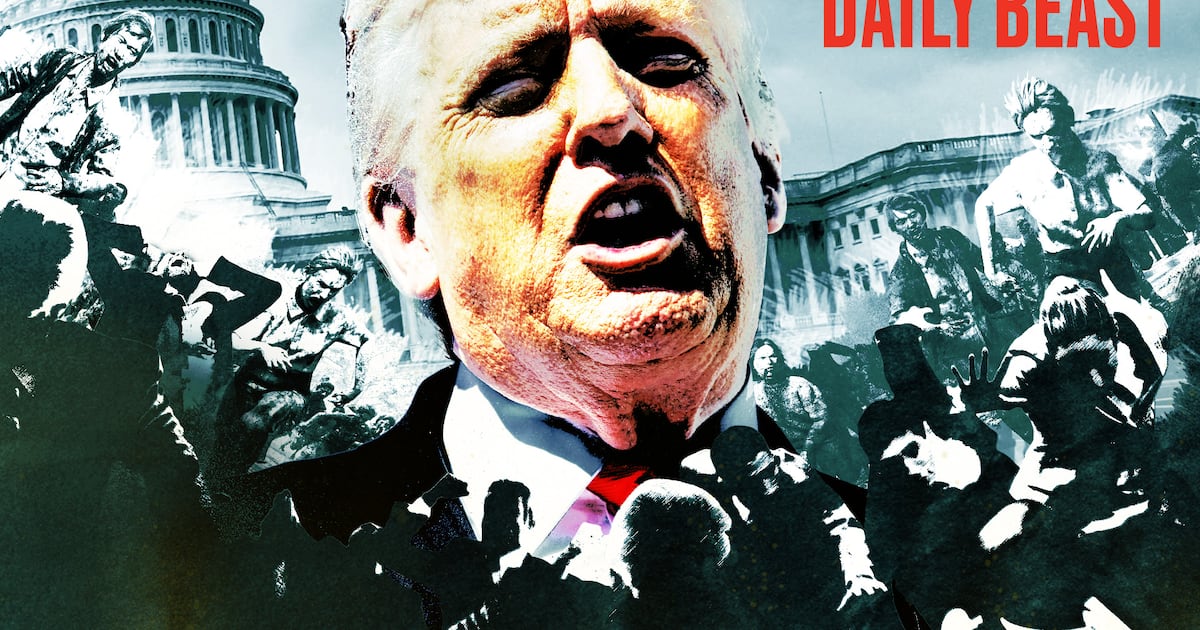With just hours to spare, House Republicans averted a catastrophe of their own making Saturday, passing a temporary extension of government funding and averting a shutdown with the help of House Democrats.
But Speaker Kevin McCarthy (R-CA) can’t exactly celebrate too much.
He has just 47 days to hammer out a full annual spending package, and come November, it’s likely he will face the same bind he did this past week. Given a recent shift among some of McCarthy’s most conservative members, the speaker will have to contend with a growing problem: some of them actually want a shutdown.
“We should not fear a government shutdown,” Rep. Bob Good (R-VA) said at a press conference earlier this week. “Most of what we do up here is bad anyway, most of what we do up here hurts the American people… most of the American people won’t even miss it if the government shuts down temporarily.”
The challenge is both political and practical.
On the practical level, the fact that House Republicans are cheering for a shutdown makes McCarthy’s life extremely complicated. It only takes about a half-dozen lawmakers to sink any partisan legislation that the speaker or his GOP conference would like to pass. Given the sheer size of the group of conservative hardliners rooting to shut it all down, McCarthy is almost certain to need Democratic votes to avert any government shutdown. That, in turn, pushes the legislation toward the center and then further irks the conservatives desperate to implement severe cuts to government spending.
On the political level, these Republicans opposing government funding just because it’s the “government” and “funding” make it extremely difficult for Republicans to blame anyone but themselves for a shutdown.
In past shutdowns, hard-right lawmakers have at least said they wanted to keep the lights on, knowing that the optics of actively cheerleading for a painful closure were obviously bad.
But this time, the Republicans making McCarthy’s life miserable spoke about a shutdown as if it would be marginally significant—or, in some cases, even a net positive.
It’s not just Good, who is one of the most dedicated conservative hardliners.
Freshman Rep. Andy Ogles (R-TN), for example, tweeted an official graphic this week—with the slogan “less government isn’t a bad thing”—that outlined which government services and programs would remain functional in the event of a shutdown, like Medicare, Social Security, and the U.S. Postal Service. Everything else, it is suggested, is not worth worrying about.
“It will be uncomfortable for some people,” said Rep. Matt Rosendale (R-MT). “But it is not going to be Armageddon.”
Perhaps not, but for decades, nearly all members of both parties knew—and still know—that government shutdowns carry instant impacts that directly harm people’s lives, from freezing key food assistance programs to federal workers’ paychecks.
What’s new is that the GOP lawmakers with the least to lose personally by forcing those impacts—and the most to gain by pleasing increasingly far-right constituents and activists—are the ones who drove Washington to the brink.
To Democratic veterans of past spending fights, the shift—exemplified by right-wing lawmakers embracing the shutdown—shows how different today’s House GOP conference is from even just a few years ago.
“This is team extreme,” said Rep. Jared Huffman (D-CA). “Not a lot of thought goes into these things—they just start saying it, and the echo chamber starts saying it, and pretty soon they’re all saying, ‘This could be a good idea.’”
For the final days of September, a small band of right-wing lawmakers resisted any short-term solution to keep the government open, insisting the House instead pass all 12 individual annual appropriations bills—even if it risked a shutdown lasting weeks or months.
These Republicans even voted down a GOP-written stopgap bill, which included deep cuts for key federal programs and codified a hardline border policy, because it did not go far enough.
Backed into a corner on Saturday, with hours left before the shutdown took hold, McCarthy decided to advance a so-called “clean” continuing resolution, which would keep the government open at 2022 funding levels—passed by the previous Democratic majority—until Nov. 17. A majority of House Republicans joined with all but one House Democrat to approve it, teeing up the U.S. Senate to approve it quickly on Saturday night.
Ninety members of the House GOP conference voted for a shutdown rather than support a stopgap bill backed by Democrats.
“I would NEVER vote for a ‘clean’ CR to perpetuate the corruption of federal government spending and debt,” tweeted Rep. Dan Bishop (R-NC) on Saturday afternoon. “But this is even worse… HARD NO. HELL NO. Catastrophic failure of leadership.”
McCarthy overcame those objections by accepting Democratic help, knowing that it could endanger his speakership: these far-right rebels have threatened to force a snap vote to oust the California Republican should he not satisfy their demands.
In the coming weeks, the Speaker could be pushed to reject an annual spending bill that could actually get President Biden’s signature, or he could get pushed out of his job altogether. Both outcomes would hasten a shutdown that conservatives have already signaled they would welcome.
As they have for the past week, frustrated rank-and-file Republicans will likely be left to stew, subtweet their colleagues, and make points about the harms of government shutdowns that were once considered obvious.
“Government shutdowns hurt working families across the nation,” said Rep. John Duarte (R-CA), in a press release earlier this week.
“It is unfair for my constituents to bear the burden of such an outcome because a handful of people want to play political games,” Duarte said, going on to argue that “certain people want to posture so they can score political points,” which would “cost the American people billions of dollars.”
Government closures are famously painful events, even far beyond the Beltway. In the event of a shutdown, millions of low-income families who rely on federal nutrition programs would soon lose access to food assistance. Millions of federal workers, including active duty military personnel, would stop receiving paychecks. National parks close, threatening communities who rely on visitors for revenue.
Shutdowns carry further-reaching ripple effects, too, slowing down essential functions of government across the board.
On Thursday, Senate Minority Leader Mitch McConnell (R-KY) pointedly noted that past shutdowns harmed the feds’ ability to enforce the U.S.-Mexico border—a pointed shot at the Republicans who want to shut down the government in protest at the Biden administration’s immigration policies.
Despite these serious impacts, hard-right Republicans spent the week insisting that a shutdown is nothing to worry about.
“The DC Uniparty wants you to fear a government shutdown—you shouldn’t,” tweeted Rep. Andy Biggs (R-AZ). “A government shutdown is a spending shutdown. They’re nervous we’re trying to change the status quo. Why spend more money we don’t have amid record inflation?”
The lawmakers pushing this talking point largely represent deeply conservative districts, where their biggest threat to political survival would not be independent voters angry about a shutdown, but far-right primary voters angry they did not grind the government to a halt. Meanwhile, in any future shutdown, it will be Republicans like Duarte—who won a district carried by Biden in 2020—who actually pay the political price.
Donald Trump, the de facto party leader, has publicly called for House Republicans to embrace a shutdown. The conservative faction’s ringleader, Rep. Matt Gaetz (R-FL), told The New York Times the move likely pushed some lawmakers off the fence.
MAGA social media personalities, who carry immense sway to set activists’ agenda, have likely been just as consequential: their emotional opposition to increased Ukraine aid and the Biden administration’s border policies has no doubt made its way to allied conservative lawmakers.
But even the lawmakers most captured by the party base are not immune to the effects of a shutdown. Federal workers live in every district in the country: Good’s district, for instance, is home to over 6,700 federal employees. Rosendale’s is home to over 10,000.
“It’s rather easy for certain media personalities to say, go ahead with the shutdown, because their paychecks aren’t going to be affected by it, they won’t have to go face federal workers in their home districts, or contractors who are doing work for the military,” said Kevin Kosar, a fellow at the center-right R Street Institute think tank. “Suddenly, they won’t have any income.”
At a certain point in a shutdown, said Huffman, even the most dug-in lawmakers start looking for an off-ramp.
“I know what this does to people,” he said. “I know that even these armchair philosophers who say this won't really affect people’s lives—they start singing a different tune a few days into a government shutdown.”








